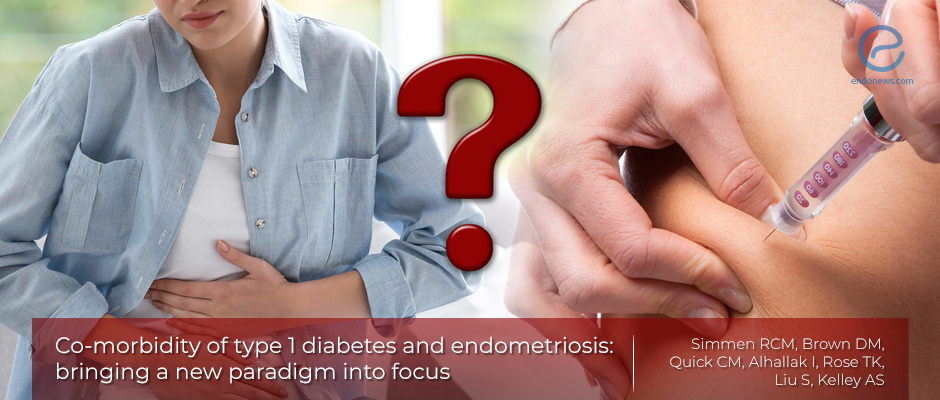Endometriosis and Insulin dependent Diabetes Mellitus
Nov 15, 2019
Awareness of co-existence of endometriosis with type 1 diabetes mellitus is a crucial issue
Key Points
Background:
- Type 1 diabetes mellitus (T1DM) results from a probable autoimmune loss of insulin producer β-cells of the pancreas.
- T1DM and endometriosis have some similar aspects, both being a chronic inflammatory process triggered by overactive immunity. Most importantly, they may occur together and awareness would improve clinical management and quality of life.
Highlights:
- The exact incidence of endometriosis in women with T1DM is unknown but many patients suffer from both conditions concurrently during their reproductive years.
- This review aims to address why these two conditions may exist together and how awareness of this would improve clinical management and quality of life considerably.
Key points:
- Endometriosis and T1DM are complex processes with their polygenic nature and their susceptibility to environmental factors.
- Immune dysregulation and enhanced inflammatory status may promote both diseases in high-risk female populations possibly with overlapping many clinical disorders.
- Reproductive-age women with co-morbid endometriosis and T1DM suffer from infertility more than those with either condition, yet pre-conception counseling for this cohort of women is likely not-yet-existent.
Conclusion:
- There is an unmet need to identify and develop novel therapeutic strategies that are safe and effective for these co-morbid conditions.
- Animal models are in need of how T1DM can promote endometriosis and conversely, how endometriosis may complicate T1DM.
- Endometriosis and T1DM must be at the forefront of future research since there is a large gap in knowledge on how genetic, endocrine and immunological factors contribute to their onset and progression.
Lay Summary
Simmen and associates from the University of Arkansas for Medical Sciences, Alabama, published a review article about the co-existence of type 1 diabetes mellitus (T1DM) and endometriosis, in the recent issue of the "Journal of Endocrinology".
Insulin-dependent diabetes or T1DM is the result of the destruction of insulin-producing β-cells of the pancreatic islands that are thought to be due to an autoimmune process. Possibly over one million Americans have this disease, with an annual economic cost of ~$14B and around 40,000 new cases seem to be diagnosed each year.
Endometriosis is an estrogen-dependent chronic disease, with implantations and growth of ectopic endometrium predominantly in the peritoneal cavity and ovaries. It affects 6–10% of all reproductive-age women with considerable morbidity, causing an estimated economic cost of ~$50B a year in the USA.
T1DM and endometriosis have similar aspects, both being chronic inflammatory processes triggered by overactivation of the innate immune system. These two diseases may occur together and awareness of this would improve clinical management and quality of life of the patients involved. However, the asymptomatic pre-clinical period of highly variable duration for each condition can lead to problems in the recognition of co-morbid disease onset and even misdiagnosed. As knowledge on each of these conditions separately has grown substantially, co-morbid endometriosis and T!DM has not been widely well recognized. This review discusses the molecular basis for the likelihood of their co-existence, and prospects for improvements in therapeutics and reduced complications.
Besides, current therapies for endometriosis to mitigate infertility could worsen T1DM with their undesirable effects on glucose metabolism. Thus, there is a current need to identify and develop novel therapeutics which should be safe and effective to address these co-morbid conditions.
The authors also conclude that endometriosis and T1DM should be fully covered in future experimental animal models since there are huge gaps in how genetic, endocrine and immunological factors contribute to their onset and progression.
Research Source: https://www.ncbi.nlm.nih.gov/pubmed/31472479
endometriosis insulin dependent diabetes type 1 diabetes

